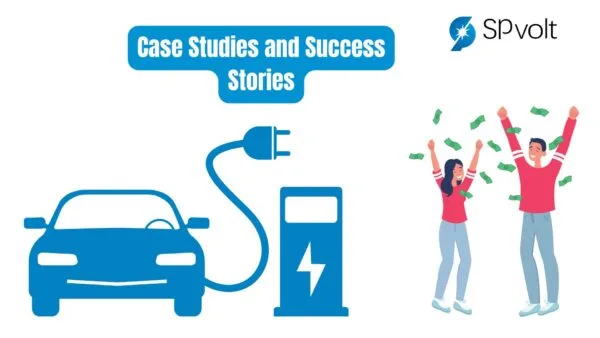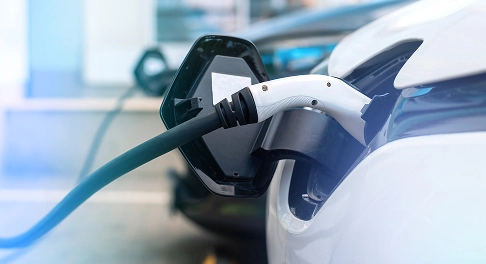The rapid adoption of electric vehicles (EVs) across Europe is driving demand for robust, accessible, and efficient EV charging infrastructure. Businesses and municipalities alike are exploring innovative solutions to meet this growing need.
This report delves into three successful case studies of EV charging station projects in Europe—Amsterdam’s urban residential network, a highway service station in Belgium, and a shopping center installation in Rotterdam.
By analyzing the strategies, outcomes, and lessons from these projects, we identify key success factors and best practices for implementing EV charging stations.
If you’re looking for a reliable supplier to support your project, SPvolt stands out as a trusted manufacturer and supplier of premium EV charging accessories, ensuring the quality and durability required for success.

Case Study 1: Urban Residential Charging Network
Project Overview: Amsterdam Residential Solution
- Location: Amsterdam, Netherlands
- Scale: 25 AC charging points across 5 residential complexes
- Investment: €175,000
- Timeline: 6 months from planning to operation
Key Success Factors
- Equipment Selection
- Partnership with reliable EV Charging Cable Manufacturer
- Type 2 connectors with enhanced durability
- Smart charging capability integration
- Weather-resistant design (IP55 rated)
- Implementation Strategy
- Phased installation approach
- Resident engagement program
- Local utility collaboration
- Municipal permit fast-tracking
- Results
- ROI achieved in 2.5 years
- 45% average utilization rate
- 92% customer satisfaction
- 30% lower maintenance costs than projected
You May Also Know: How to Start an EV Charging Station in Europe
Case Study 2: Highway Service Station Integration
Project Overview: Belgian Highway Location
- Location: E40 Highway, Belgium
- Scale: 4 DC fast chargers + 8 AC charging points
- Investment: €400,000
- Timeline: 8 months from concept to launch
Technical Implementation
- Equipment Configuration
- High-quality DC EV Charger Manufacturer equipment
- Dual charging capability
- Advanced cooling systems
- Integrated power management
- Infrastructure Development
- Grid capacity upgrade
- Custom cable installation from Electric Vehicle Cable Supplier
- Weather protection structures
- Advanced monitoring systems
- Performance Metrics
- 65% utilization rate
- €25,000 monthly revenue
- 3.5-year payback period
- 99.7% uptime achievement
You May Also Know: EV Charging Station Business In Europe: Financial Planning and ROI Analysis
Case Study 3: Shopping Center Installation
Project Overview: Rotterdam Mixed-Use Development
- Location: Rotterdam, Netherlands
- Scale: 12 AC + 2 DC charging stations
- Investment: €250,000
- Timeline: 4 months implementation
Innovation Features
- Technical Solutions
- Smart load balancing
- Solar integration
- EV Charging Connector Manufacturer customization
- Advanced payment systems
- Business Model Innovation
- Retail partnership program
- Dynamic pricing strategy
- Marketing integration
- Customer loyalty system
- Impact
- 40% increase in shopping duration
- 25% additional retail revenue
- 52% utilization rate
- 4-year ROI achievement
Success Patterns and Best Practices
Technical Excellence
- Equipment Selection
- Quality certification focus
- Future-proof technology
- Reliable supplier partnerships
- Regular upgrade paths
- Installation Standards
- Professional installation teams
- Thorough testing protocols
- Regular maintenance schedules
- Quality control systems
Business Strategy
- Location Selection
- Traffic flow analysis
- Competition mapping
- Growth potential assessment
- Infrastructure availability
- Pricing Strategy
- Market-based pricing
- Dynamic adjustment
- Subscription options
- Partnership rates
Operational Excellence
- Customer Service
- 24/7 support availability
- Quick response protocols
- User education programs
- Feedback implementation
- Maintenance Management
- Preventive maintenance schedule
- Quick repair response
- Quality parts inventory
- Technical training
Lessons Learned and Recommendations
1. Critical Success Factors
- Strong supplier relationships
- Quality equipment selection
- Professional installation
- Regular maintenance
- Customer service focus
- Dynamic business model
- Marketing integration
- Community engagement
2. Common Challenges and Solutions
Technical Challenges
- Grid capacity limitations
- Solution: Phased implementation
- Solution: Smart load management
- Solution: Power upgrade planning
Operational Challenges
- Customer adoption
- Solution: Education programs
- Solution: Marketing campaigns
- Solution: Partnership development
Financial Challenges
- Initial investment
- Solution: Phased deployment
- Solution: Partnership funding
- Solution: Grant applications
Future Outlook and Opportunities

Market Trends
- Increasing demand for fast-charging
- Growth in residential solutions
- Integration with smart grids
- Enhanced user experiences
Technology Evolution
- Higher power capabilities
- Advanced connectivity
- Improved efficiency
- Enhanced durability
Conclusion
The success of EV charging station projects in Europe underscores the importance of quality equipment, strategic partnerships, and a customer-centric approach.
From urban residential complexes to highway service stations and retail destinations, these case studies reveal how thoughtful planning, technical innovation, and operational excellence contribute to sustainable outcomes. For those looking to enter this burgeoning market, a clear focus on scalability, community engagement, and technological advancements is essential.
SPvolt is here to support your journey with high-quality EV charging accessories designed to meet the demands of modern infrastructure. Contact us today to bring your EV charging station vision to life with reliable solutions and expert guidance.



